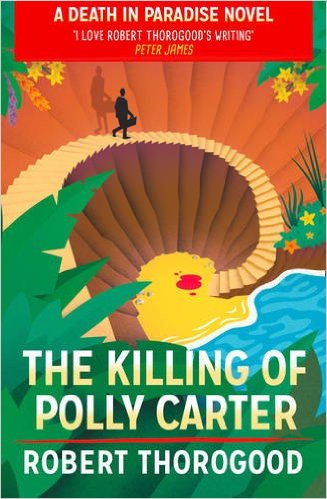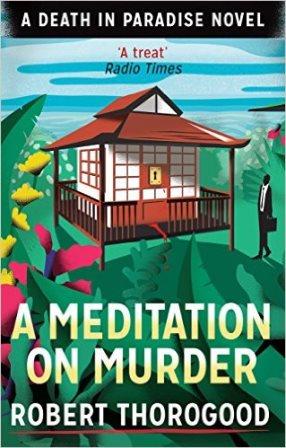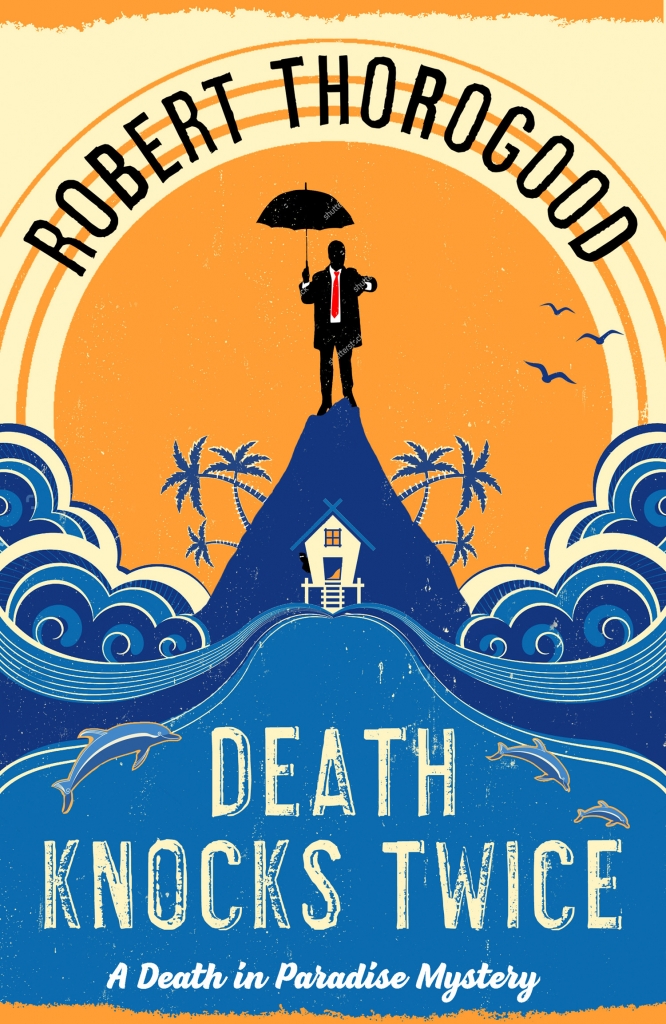
No one could have killed Polly Carter…but someone did.
This is a locked room mystery that takes place in a garden with a cliff top and some extremely convenient shrubbery. Oh, and it takes place in the Carribean. And Polly’s a celebrity (of course: who else would have a cliff top with beach access conveniently situated in their garden?)
What’s it about?
Polly Carter is a retired (though certainly not retiring) supermodel who just happens to have several friends staying at her “home” (a huge mansion on a remote Carribean island) when she abruptly declares her intention to commit suicide and seemingly leaps to her death from a staircase.
Despite her non-identical twin sister and house guest, Claire Carter, assuring Detective Inspector Richard Poole that Polly’s final actions were to pick a fight with her sister, announce her suicidal intent and fling herself onto the beach from a great height, DI Poole is unconvinced. After all, if Polly intended to make her sister feel guilty by jumping to her death in front of her eyes, why did she wait to do it until she was out of Claire’s eyesight? And that’s just the beginning of the oddities.
Ooh, this is sounding good
Richard Poole knows two things: 1. The Carribean is out to get him, and 2. Someone killed Polly Carter in what appears to be an astonishingly convenient coincidence (for the killer, obviously, not for poor Polly). It can’t be Claire – she’s wheelchair bound, as Polly well knew, since Polly put her there – but Polly had several other house guests, all hiding secrets and slights that DI Poole is determined to unravel.
Or at least…he is determined to unravel the case, when he’s not distracted by wondering why his so-perfect-she-makes-him-nervous mother has decided to visit him without the accompanying presence of his nothing-you-do-is-good-enough-for-me-son father. And is she really flirting with his least law-respecting officer, Dwayne Myers?
What’s it like?
Wonderfully comic in a beautifully understated way. This is the opening:
‘Detective Inspector Richard Poole sat on the verandah of his beachside shack looking up at the cloudless Carribean sky in inarticulate outrage.
‘A passing parrot had just crapped in his cup of tea.’
Later he reflects that another mildly irksome incident ‘was merely one of the almost infinite ways that the Carribean tried to spoil his entire existence’.
It’s worth reading for the comic touches alone, but it’s also a damn good mystery.
Whodunit?
Suffice it to say that all Polly’s guests turn out to have motive to off her, and Polly herself is difficult to get to know when she’s already dead. There’s a lot of enjoyable detective work as DI Poole and his team pull at various threads and begin to discover who exactly lost patience with her in the end.
I thoroughly enjoyed reading about the police work and witnessing the team catching out Polly’s houseguests in various half-truths and outright lies. I liked that – although unexpected – it would have been possible to work out whodunnit, though possibly not why. I was slightly irked by a detail or two that – in hindsight – seemed misleading, but I’d happily forgive a book which gripped me enough to read in one sitting much more than that.
The characters’ backgrounds and motivations are well-sketched and I can imagine this being made into a successful murder mystery board game – any of the characters could have done it really. The denouement is suitably talky for Agatha Christie fans and the closure is complete.
Final thoughts
I loved this story and could tell from the ‘a death in Paradise novel’ tag that it was going to be part of a series, so I was thrilled to see that actually it’s the second in a planned series of (at least) three books and ‘A Meditation on Murder’ has been very well-received by fans of the BBC TV show (which I never previously knew existed). (To anyone yet to buy me a Christmas present: hint, hint!)
It’s not perfect, (it took me maybe two chapters to work out a fundamental part of the plot which it seemed to take DI Poole almost the entire book to work out and I couldn’t quite fathom how it wasn’t blindingly obvious,) but it’s very close to perfect and, more importantly, seriously enjoyable to read.
I don’t think of myself as a ‘cosy crime’ fan, (I will not read anything that features a crime-fighting pet, for example,) but I had forgotten that I enjoyed Agatha Christie-esque stories so much. So many thanks to Robert Thorogood for reminding me of that. Now I’m off to look up this BBC TV series…


